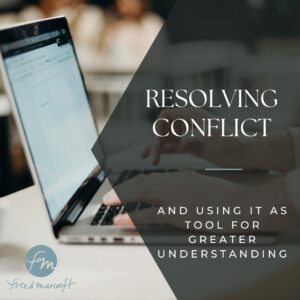How to Resolve Conflict in a Marriage
 The first key to knowing how to resolve conflict in a marriage is knowing that where there are people, there is conflict. Conflict is something to understand, not avoid. Read on how to learn about the types of reactions to conflict, how to work through it, and how to use conflict as a tool to better understand your spouse and yourself.
The first key to knowing how to resolve conflict in a marriage is knowing that where there are people, there is conflict. Conflict is something to understand, not avoid. Read on how to learn about the types of reactions to conflict, how to work through it, and how to use conflict as a tool to better understand your spouse and yourself.
Note that this discussion is not intended to address situations where your physical safety or that of others is in danger. In those circumstances, contact the police or take measures to remain safe.
Different Responses to Conflict
You’ve heard of fight or flight, and you may have even heard of freeze and appease. You know we all have a “natural” response to conflict — but do you know that we also have the power to choose our response?
Some people’s default conflict response is to try to avoid conflict. Others attempt to smooth things over to end the conflict, or are confrontational. The Empowerment Dynamic encourages us to consider a different approach to conflict — “Accepting.”
Read: How to Handle a High Conflict Spouse During Divorce
Conflict as a Tool for Greater Understanding Of Yourself & Your Marriage
It’s initially counterintuitive to think of marital conflict as an opportunity to better understand yourself and your partner, but it is. Consider this premise — we tend to disagree about things we feel strongly about. Understanding what we, and our spouse, feel strongly is a window to what matters most to us. What matters most to us leads us to discover what we truly want for our lives, including our marriages.
Focus on Listening Through the Conflict
How do you begin to get these insights? First, when a conflict arises, commit to listening to your spouse. This is simple, but it probably (especially initially) won’t be easy. The first key to listening is to stop talking. But being quiet alone isn’t enough; you must commit to genuinely hearing.
Read: Using Ear Statements to Solve Problems With Your Ex
Get Curious About Your Spouse and Yourself
Once you start listening, you will find yourself getting curious. First, listen to your spouse’s actual words, and then listen behind them. What is your spouse sharing they truly care about and value? What new things can you learn about your spouse?
Donna Zajonc and David Emerald are the leaders of the Center for the Empowerment Dynamic. As spouses and thought leaders around relationships and self-empowerment, their insights on their own marital conflict response are particularly instructive:
“It was at this point that we realized staying in conversation as the conflict played out created a much deeper understanding of the situation. Much to our surprise, what we found was that creative conflict clarifies differences and that a new way often arises with a much better approach than before the conflict arose.”
Curiosity and Resolving Marital Conflict
Curiosity doesn’t so much resolve marital conflict as it does transform it. Once you dig into listening and learning, your view of the situation will change. In other words, your focus shifts away from the conflict itself to what you can learn about your spouse. This is what I meant above when I said that conflict can be a window to what matters most.
Read: Personal Growth & Divorce
Conflict and Learning About Yourself
Conflict doesn’t only offer us an opportunity to learn about our spouse. Digging into our own conflict response can also help you understand what you truly want for your life. For people considering divorce, this can help you understand your marriage in the context of your goals for your life. For example, are your values and dreams for the future aligned? Do you want to commit to improving your marriage together with your spouse? Or, is it time to move on and transition out of the marriage?
Read: When Should You Hire a Divorce Attorney?
Read: Options When You’re Unhappy in Your Marriage
Next Steps
Now that we have reviewed how to resolve conflict in a marriage, you have learned how to further explore this in your own relationship. If you are contemplating divorce, consulting with a divorce lawyer can assist you in making an informed and empowered decision about your marriage. If we can be helpful, please contact us here.








